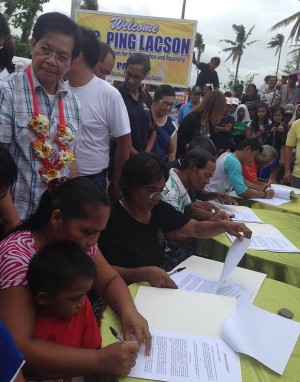
Presidential Assistant for Rehabilitation and Recovery Panfilo Lacson witnesses the turnover of 20 housing units completed by Gawad Kalinga in barangay Pago, Tanauan, Leyte on Saturday. (Malacañang Photo Bureau)
Officials of towns and cities in Cebu that were badly hit by supertyphoon Yolanda “who have done their homework” were assured by a top Malacañang official of immediate assistance by the government.
“Instead of waiting (for a master plan) I will recommend to him (President Aquino) to proceed with the rehabilitation of northern Cebu and Leyte areas which have already submitted (their plans),” Secretary Panfilo Lacson, the presidential assistant on rehabilitation and recovery, told reporters.
Lacson and Education Secretary Armin Luistro were in San Remigio town, northwest Cebu , yesterday for the groundbreaking and agreement signing for the construction of a three-story school building for Argawanon Integrated School. The six-classroom building is donated by the Aboitiz Foundation.
Lacson, in his remarks, commended Cebu province for finishing its post-Yolanda rehabilitation plan and program of works ahead.
The plans were submitted in early April by Baltazar Tribunalo, head of Provincial Task Force Paglig-on, after a detailed survey of 14 towns and the city of Bogo in northern Cebu, and consultations with local officials and communities.
Cebu province submitted a revised P10.45 billion rehabilitation plan, with the bulk of the budget request needed for shelter and resettlement at P6.6 million.
What Cebu officials are waiting to hear is how much of the bill will be paid by the national government.
Lacson is expected to visit Cebu again in the next few weeks, hopefully with checks of fund support.
Instead of waiting for the April 21 deadline to submit to President Aquino a Post-Disaster Need Assessment, Lacson said he would recommend “to proceed with the rehabilitation of northern Cebu and Leyte” “para meron incentive yung local government officials who have been proactive enough to do their own homework in submitting the needs and damage assessment, and also their rehabilitation plan.”
He explained that the law requires a “master rehabilitation plan” approved by the President before any rehabilitation work could start and that master plan is still pending.
This procedure is a requirement by Republic Act 1012 that strengthens the Philippine Risk Reduction and Management System.
Last Friday, town mayors voiced frustration over the absence of any assistance even after they had submitted their rehabilitation plans.
Lacson said he anticipated the gap of the distribution of funds to local government units (LGUs) hit by Yolanda.
He said this isn’t because the government is slow or lacks funds, but due to international protocols and existing laws to be followed about the use of rehabilitation funds.
Land ownership
He was supposed to attend last Friday’s meeting but he was in Tacloban distributing checks to town mayors and was in a meeting for the creation of a “multi-hazard map”.
Cebu town mayors said they have identified relocation sites for coastal residents affected by the 40-meter “no build zone”, but there were no local funds to purchase the properties, most of which lacked land titles.
Lacson said he will discuss this on Monday at a cabinet cluster meeting with Department of Agrarian Reform (DAR) and Department of Environment and Natural Resources (DENR).
“There are available properties but we still need to fix these real estate properties owned by the government. Some still need Certificate of Land Ownership Award (CLOAs) that entails presidential proclamations before giving it to LGUs,” said Lacson.
Lacson said rehabilitation programs of the government would be in “full swing” by June.
In the meantime, the private sector has been bridging the gap, such as the Aboitiz Foundation’s donation of a school building for San Remigio.
Classrooms
Macario Ricarte Jr., principal of the Argawanon Integrated School, said Yolanda destroyed 10 classrooms.
“We are just so grateful that we are chosen to be given classrooms. Our enrollment is increasing every year, even before Yolanda, we already had problems with our old classrooms,” said Ricarte.
Aboitiz Foundation plans to build 200 classrooms for San Remigio, Bogo City and Medellin. The Ramon Aboitiz Foundation Inc. also plans to build over 180 classrooms for Daanbantayan and in Bantayan Island’s three towns. Aboitiz is spending P400 million for these. Its construction arm, Metaphil, will construct the buildings which can withstand an intensity-9 earthquake and typhoons of 250-kilometer-per-hour winds.
Leading yesterday’s ceremony were Erramon Aboitiz, Jon Ramon Aboitiz, Lacson, Luistro, Gov. Hilario Davide III, DepEd-7 Director Carmelita Dulangon and Bogo Mayor Celestino Martinez Jr.
The three-story building will be completed in time for the opening of classes this June.
Luistro said 3,000 classrooms in the four regions affected by Yolanda have been rebuilt or repaired by private groups.
